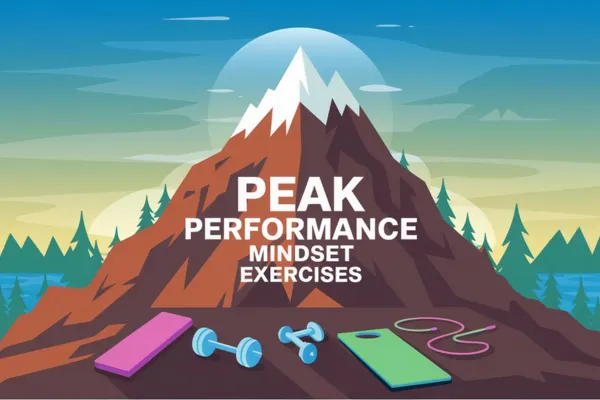

Mindset Hacks for Peak Performance: Unlock Success
In today's fast-paced world, success isn't just about hard work – it's also about cultivating the right mindset. This following guide will show you how to develop a positive, resilient, and growth-oriented mindset. Such a mindset can propel you towards your goals and unlock your full potential.

Whether you're aiming to excel in your career, achieve your fitness goals, or unlock new levels of personal growth, the right mindset is crucial. By mastering "mindset hacks," you'll learn to overcome limiting beliefs and boost your mental toughness. You'll also develop strategies to thrive in any situation. From reframing negative thoughts to cultivating gratitude and optimism, you'll gain a powerful toolkit to unleash your full potential and achieve peak performance.
Power of a Positive Mindset
Embracing a positive mindset is crucial for reaching peak performance. By employing positive mindset strategies and cognitive behavioral techniques, we can build resilience and tap into our full potential.
Reframing Negative Thoughts
Reframing negative thoughts is a key strategy for a positive mindset. We can challenge our automatic negative thoughts and replace them with more positive ones. This approach, known as cognitive behavioral therapy, significantly improves well-being and performance.
Cultivating Gratitude and Optimism
Building gratitude and optimism also enhances our mindset. Focusing on life's positive aspects and tackling challenges with a problem-solving attitude makes us more resilient. Exercises like keeping a gratitude journal or practicing positive self-talk foster this mindset shift.
By adopting positive mindset strategies and cognitive behavioral techniques, we unlock our minds' true potential. The path to peak performance starts with a mindset that values growth, welcomes challenges, and exudes optimism.

The greatest weapon against stress is our ability to choose one thought over another.
- William James
Overcoming Limiting Beliefs
Our beliefs significantly influence our lives. Many of us are hindered by self-limiting thoughts, preventing us from achieving our full potential. Fortunately, we can liberate ourselves from these constraints by identifying and challenging our limiting beliefs.
Identifying Self-Limiting Thoughts
First, we must recognize the self-limiting thoughts that restrict us. Notice the internal dialogues that erode our confidence or deter us from taking risks. These thoughts often manifest as "I'm not good enough," "I can't do that," or "It's too difficult." Once we're aware of these patterns, we can challenge them.
Challenging Limiting Beliefs
Question the evidence: Examine the facts supporting your limiting beliefs. Are they factual, or are they mere assumptions?
Reframe the narrative: Swap negative self-talk with more positive, empowering statements. For example, "I may not be able to do it yet, but I can learn and improve."
Seek external perspectives: Consult trusted friends or mentors for alternative, more objective viewpoints.
Take small, actionable steps: Divide your goals into smaller tasks to build confidence and momentum.
By consistently challenging our limiting beliefs and adopting a growth mindset, we can surpass the barriers that have restricted us. This journey to overcome limiting beliefs is not straightforward, but the outcomes are profoundly transformative.

The only limit to our realization of tomorrow will be our doubts of today.
- Franklin D. Roosevelt
Developing a Growth Mindset
Adopting a growth mindset is crucial for reaching your highest potential and achieving top performance. It differs from a fixed mindset, where you believe your abilities are unchangeable. A growth mindset sees your skills and talents as improvable through effort and persistence.
At its core, a growth mindset involves a readiness to tackle challenges, persist over hurdles, and see mistakes as chances for learning and enhancement. Rather than avoiding difficulties, those with a growth mindset view them as opportunities to expand their abilities and challenge themselves further.
Embrace Challenges: Welcome new experiences and tasks that push you outside your comfort zone. Treat them as a chance to learn and grow, rather than a threat to your ego.
Persist Through Setbacks: When faced with obstacles or failures, don't give up. View them as temporary roadblocks on your path to success, and use them as motivation to work even harder.
Seek Feedback: Actively seek out constructive feedback from others, and use it to identify areas for improvement. Treat criticism as a valuable tool for personal growth, not a personal attack.
Focus on the Process: Shift your attention from the end result to the journey itself. Celebrate the small wins and the progress you make, rather than solely focusing on the final outcome.
By embracing a growth mindset, you open up a realm of possibilities and pave the way for enduring success. Embrace the challenges, learn from your mistakes, and never cease striving to enhance yourself. This mindset is the cornerstone of unlocking your true potential and achieving peak performance.

The future belongs to those who learn more skills and combine them in creative ways.
- Robert Greene
Mindset Hacks for Peak Performance
Achieving peak performance transcends skill and knowledge enhancement. It's about cultivating a mindset that thrives on challenges, learns from setbacks, and values each small victory. Here, I'll unveil practical mindset hacks to help you tap into your potential and elevate your mental toughness and resilience.
Embracing Failure as a Learning Opportunity
Failure is often viewed as a hindrance, yet it's a crucial stepping stone to success. With the correct mindset, it morphs into a chance to learn, expand, and refine your tactics. Instead of fixating on the negative, focus on the valuable lessons gleaned. These insights can shape your future endeavors and strategies.
Celebrating Small Wins
It's easy to overlook the importance of small victories in the chase for grand goals. Each achievement, no matter how minor, reflects your dedication and advancement. Acknowledging and valuing these milestones builds momentum and self-assurance, driving you forward.
Adopting these mindset hacks in your everyday life paves the way for peak performance and realizing your full potential. The path to success is not straightforward, but by embracing its ebbs and flows, you cultivate the mental toughness and resilience to navigate any challenge.
Cognitive Behavioral Techniques
Cognitive behavioral techniques are key to reshaping your mindset and overcoming limiting beliefs. They help you identify and change irrational thoughts that hold you back. This can lead to new success and achievement.
Restructuring Irrational Thoughts
Cognitive behavioral therapy shows that our thoughts, feelings, and actions are deeply connected. By challenging and changing negative thoughts, we can shift our mindset. This opens up new possibilities for growth and success.
Exercises like thought record keeping and cognitive restructuring help you spot and replace negative thought patterns. With these tools, you can become more aware of your thoughts. By actively changing your beliefs, you build a strong cognitive behavioral toolkit. This supports your journey to peak performance.
Free Training: Flow State Money Reset
Discover why your income keeps swinging from $8k to $2k months and how to finally create steady, predictable revenue that matches how God designed you to thrive.


In this FREE masterclass, you’ll learn:
☑️ The hidden misalignment (not mindset!) that keeps your income unpredictable, even when you're faithfully showing up and doing the right things.
☑️ Why launches bring in clients one month…and leave you scrambling the next, and the gentle shift that finally balances the flow.
☑️ How forcing fast or unnatural strategies drains your momentum, and what aligned, sustainable growth really looks like.
Built for women who’ve invested in every program, prayed, and hustled, yet still feel stuck. This free reset helps you build steady income that aligns with how God designed you to thrive.
Tap into the flow, without burnout, burnout, or overextending.
You were never meant to chase what God already designed you to attract.
Helping faith-led women build businesses that flow with peace, purpose, and prosperity.

Connect
Email: [email protected]
@2025 i-AM Life by Design | All Rights Reserved
